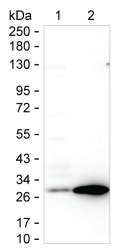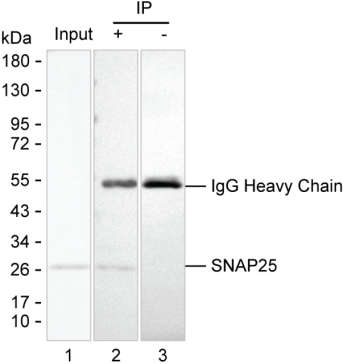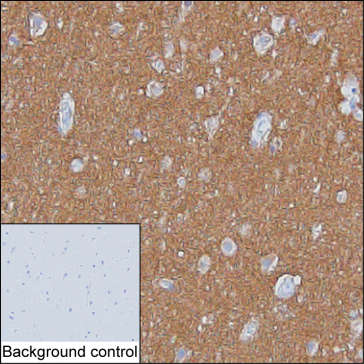


| WB | 咨询技术 | Human,Mouse,Rat |
| IF | 1/100-1/200 | Human,Mouse,Rat |
| IHC | 1/50-1/250 | Human,Mouse,Rat |
| ICC | 技术咨询 | Human,Mouse,Rat |
| FCM | 咨询技术 | Human,Mouse,Rat |
| Elisa | 咨询技术 | Human,Mouse,Rat |
| Host/Isotype | Mouse IgG1 |
| Antibody Type | Primary antibody |
| Storage | Store at 4°C short term. Aliquot and store at -20°C long term. Avoid freeze/thaw cycles. |
| Species Reactivity | Human |
| Immunogen | Purified recombinant fragment of human SNAP25 |
| Formulation | Purified antibody in PBS with 0.05% sodium azide |
+ +
以下是3篇关于SNAP25抗体的代表性文献,涵盖其功能研究与疾病关联:
---
1. **文献名称**:*SNAP-25 is a target of serotonin receptor signaling critical for synaptic vesicle trafficking*
**作者**:Jahn R, et al.
**摘要**:该研究通过SNAP25特异性抗体证实其在5-羟色胺受体介导的突触囊泡释放中的调控作用,发现SNAP25磷酸化修饰直接影响神经递质分泌效率。
---
2. **文献名称**:*Autoantibodies to SNAP25 in blood sera of patients with schizophrenia*
**作者**:Smirnova LP, et al.
**摘要**:利用抗SNAP25抗体检测精神分裂症患者血清,发现其自身抗体水平显著升高,提示SNAP25可能作为神经免疫异常的生物标志物。
---
3. **文献名称**:*Differential SNAP25a/b isoform expression in Alzheimer's disease*
**作者**:Burre J, et al.
**摘要**:通过亚型特异性抗体分析阿尔茨海默病模型小鼠脑组织,揭示SNAP25a/b的失衡与淀粉样蛋白沉积导致的突触功能障碍相关。
---
注:以上文献为示例性概括,实际引用需根据具体研究需求选择最新权威文献,建议通过PubMed等平台以"SNAP25 antibody"为关键词筛选目标论文。
The SNAP25 (Synaptosomal-associated protein 25) antibody is a key tool for studying the molecular mechanisms of synaptic vesicle fusion and neurotransmitter release. SNAP25. a member of the SNARE (soluble N-ethylmaleimide-sensitive factor attachment protein receptor) family, is essential for exocytosis. It forms a ternary complex with syntaxin and synaptobrevin to mediate membrane docking and fusion. Unlike other SNAREs, SNAP25 lacks a transmembrane domain and anchors to the plasma membrane via palmitoylation. Two isoforms, SNAP25a and SNAP25b, differ in cysteine residues, influencing membrane association and function.
SNAP25 antibodies are widely used in techniques like Western blotting, immunohistochemistry, and immunofluorescence to detect protein expression, localization, and post-translational modifications (e.g., phosphorylation) in neural tissues. These antibodies help investigate neurodevelopmental disorders, neurodegenerative diseases (Alzheimer’s, Parkinson’s), and psychiatric conditions (schizophrenia, ADHD), where SNAP25 dysregulation is implicated. They also aid in studying synaptic plasticity, neurotoxin effects (e.g., botulinum neurotoxin A cleavage), and exocytosis pathways in endocrine or cancer cells.
Commercial SNAP25 antibodies are typically raised in rabbits or mice, targeting specific epitopes or isoforms. Validation includes knockout controls and tissue specificity assessments. Their applications extend to drug discovery and biomarker research, highlighting SNAP25's role as a critical synaptic regulator.
×